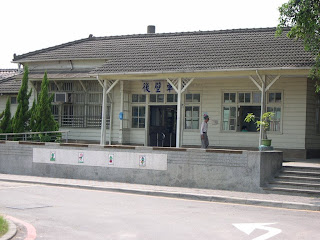 When I first came to Taiwan in 1991, very little English was spoken in the country's bus and train stations, and English-language timetables were hard to find.
When I first came to Taiwan in 1991, very little English was spoken in the country's bus and train stations, and English-language timetables were hard to find.I remember studying a bilingual map and laboriously copying out the Chinese characters for the city of Taichung, my first destination outside Taipei. I handed the scrap of paper to the ticket clerk; he read it, pointed out the price, and gave me a ticket. I then compared the characters on the ticket to what was on my map. To my consternation, they were different! Fortunately, a kindly Taiwanese woman explained that 臺中 was simply a different way of writing 台中.
I got to my destination successfully, and have been a devoted train rider ever since. Over the years, I've observed with pleasure and satisfaction how the Taiwan Railway Administration (TRA) - the part of the Ministry of Transportation and Communications that runs the country's conventional railways - has enhanced and bilingualized its services. Now, announcements in major stations are in English as well as Mandarin and Taiwanese. Also, TRA has promised to do something about its tickets, which are still in Chinese only.
It wasn't until recently, however, that I found out locomotives have been running in Taiwan for more than 120 years. Back in the 1880s, Liu Ming-chuan, a provincial governor of the Qing Dynasty remembered for his progressive policies, oversaw the construction of a rail link between Keelung in the north and Hsinchu in the northwest of Taiwan...
If you want to read the rest of this article, go to the magazine's website, then type my name into the search function. A list of the articles I've done for them since 2005 then comes up. The photo above is of Houbi Railway Station, a place I mention in this article on historic and picturesque stations.

1 comment:
Also, TRA has promised to do something about its tickets, which are still in Chinese only.
It's probably a safe bet that when they finally add English and romanization, they'll first screw it up by spelling things wrong and then change the romanization system. It is the Taiwan way....
Post a Comment